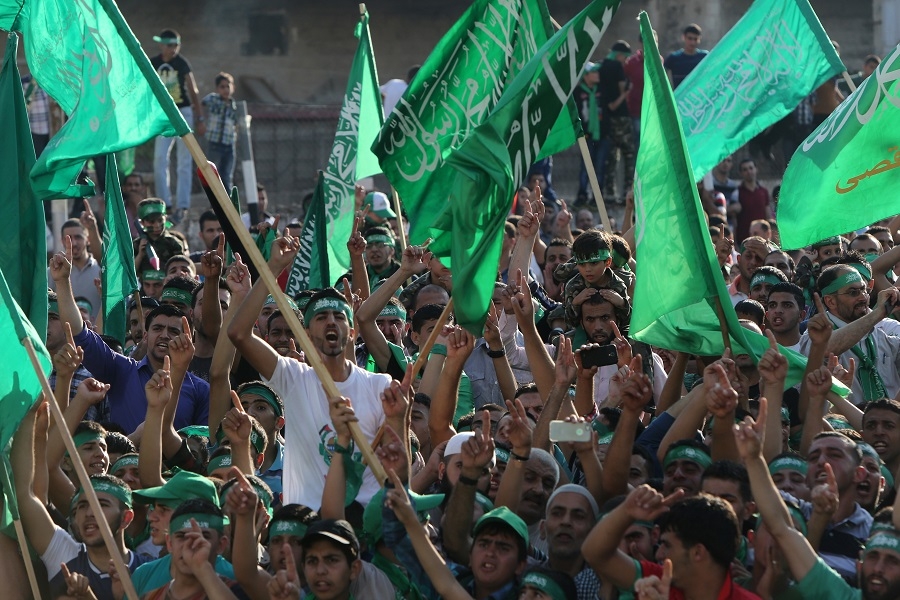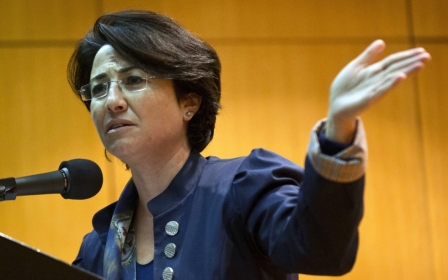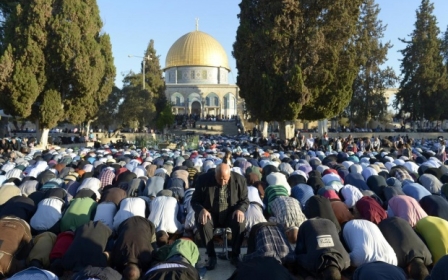West Bank academics fear reprisals for their politics

RAMALLAH – The Israeli army has identified universities in the West Bank as part of the civilian network used by Hamas to “generate support for its violence”. Universities, the Israeli army states, are used by Hamas to “recruit terrorists and implement its radical Islamic ideology,” adding, “The IDF must weaken the organisation’s civilian resources, which serve as a lifeline for its daily terror.”
Students and professors at Palestinian universities fear affiliation with Hamas may result in arrest in the course of the army’s ongoing operations to weaken support for the organisation on campuses. However, few believe Israeli authorities’ attempts are effectively reducing support for the Islamist resistance movement in West Bank universities.
Dr. Raed Abu Badawieh, 41, a French-Palestinian professor of law at Al-Najah University, is among those to have been temporarily detained by Israeli authorities for his alleged connections with Hamas. Although he was not officially charged, his wife and French media reported Israeli authorities suspected him of, “propagating Hamas’ ideas at the university” and “harbouring a Hamas sympathiser in his classes.”
Professor of political science, Dr. Sattar Kassem, 66, is another of the university’s staff to have been detained by the Israeli army. Although Dr. Kassem is not a member of Hamas, he has spoken publicly about his intentions to run in the next presidential elections with Hamas’ financial support. He told Middle East Eye that fear of reprisals for political affiliation has created an atmosphere at al-Najah where, “Students and professors at al-Najah are afraid to express themselves politically.”
Although Dr. Kassem and Dr. Abu Badawieh were duly released and are teaching again, according to the Ahrar Center, (a Palestinian rights organisation that collects information on Palestinian detainees in Israel) at least seven Palestinian professors are currently in Israeli detention for their political affiliation.
Ahmed, (which is not his real name) studies engineering at al-Najah. He describes himself as a supporter, but not a member of Hamas. Ahmed told MEE he is fearful that, “If you say you’re a member of Hamas, you’ll go to prison,” adding, “So you work for Hamas, maybe you’re a member of Hamas, but you don’t say you are.”
For students, suspected affiliation with Hamas poses a threat to their university enrolment and academic progress. Tareq, an architecture student at Bir Zeit who spoke on the condition of anonymity, recently served a six-month term in two Israeli prisons for previously being a member of Hamas’ student council. “Association with Hamas is ruinous,” said Tareq. “You can’t study, so you can’t work or earn money. This stunts graduation, employment, traveling, even getting married.”
A potent example of this academic disruption comes from Al-Quds University: “We have a student from al-Quds University who has been enrolled in a Master’s Degree for 13 years,” says Mr. Osama Risheq from the law clinic at al-Quds. “Another, doing a masters in Sharia has been enrolled for eight years. They both have only been able to complete 36 academic hours because of repeated administrative detentions. They’re actually in detention again now. These two students - they are Hamas.”
Risheq added that, “60 percent of students arrested from al-Quds last year were arrested during exam months and graduation periods,” noting too that, “in 2013, 200 al-Quds students were summoned for interrogations.”
Despite requests, the Israeli army were unable to provide comprehensive figures of students in Israeli detention. A spokesperson for the Palestinian Ministry of Detainees told MEE that of approximately 6,200 Palestinian political detainees in Israel, “the population in its highest concentration is in university students’ age group, 18-25.”
The Right 2 Education organisation based at Bir Zeit told MEE that 500 students from the university have been detained by Israeli authorities for their political affiliation within the last five years. In 2013, 42 students were detained from Bir Zeit while 60 were detained from al-Quds, which has campuses in Jerusalem, Abu Dis, and Al-Bireh.
The role - if any - of Palestinian security forces in students’ arrests is contested. Major General, Adnan al-Damiri, spokesman for the Palestinian Security Services told MEE, “There is no cooperation between Palestinian police and Israeli authorities when it comes to arresting university students. None.”
But recent graduate of the business faculty at Bir Zeit and a coordinator of the International Solidarity Movement, Karam disagrees. According to Karam, the Palestinian Authority works in tandem with the Israeli army to quell Hamas’ presence on campuses: “Usually the IDF come four or five days after the PA. It’s not like the PA will arrest someone and the Israeli authorities won’t - the same people the Israelis take, the PA takes - and vice versa.” Mr. Risheq and Dr. Kassem allege PA involvement in students’ arrests too.
At Bir Zeit, Tareq believes Palestinian authorities coordinated with the Israeli army on his most recent detention and interrogation: “When the PA came to my house on 14 September, they confiscated everything - laptops, cameras, hard drives, a brand new tablet still in its packaging; they even took our Play Station. The IDF broke in our door over a week later, at 1:15 am on 23 September. When the commanding officer sat down with me, he asked whether the PA had given me my computer back - he knew exactly what the PA had taken from our apartment the previous week.”
Major General, Adnan al-Damiri says these Hamas affiliated students are instructed by the organisation’s leaders to portray themselves as victims of the Palestinian and Israeli authorities for political ends, and in order to “violate the image of the Palestinian Authority.” He describes students’ attempts to implicate Palestinian police in Israeli arrests as “propaganda,” and “a PR tactic.”
However, on Sunday, Khalil Assaf, a senior member of the Palestinian Subcommittee for Civil Liberties publically stated that the Palestinian Authority regularly arrests Palestinians for their political affiliation. “Every day people are being detained in the West Bank because of their political affiliation,” Assaf stated, “We’re talking about dozens.” His statement supports and may legitimise these students’ claims.
Students, professors, and Palestinian security officials do not believe that measures taken by the Israeli army to diminish Hamas’ presence on campuses are having a meaningful impact.
According to Ahmed, students who spend time in Israeli prisons learn political leadership skills from Hamas leaders already imprisoned: “The Hamas students from al-Najah who are in prison now will meet Hamas’ leaders already in prison. They’ll eat together, pray together, exchange ideas and skills. For students, prison is a kind of political education - students go in, but leaders come out.” At Bir Zeit, Tareq agreed with Ahmed’s assessment, “Exactly.”
Karam said that by arresting students, Israeli authorities are empowering Hamas affiliated students: “They’re reinforcing students’ image as political leaders within universities. These students earn respect from their peers because they are believed to be doing something for their country, just by serving in an Israeli prison.”
“If anyone from Palestinian society is arrested by the Israeli authorities, they will be a hero,” said Major General al-Damiri. “If Israeli authorities continue to arrest Hamas students and professors, Hamas will become stronger in the universities.”
The most recent student council election results at al-Najah and Bir Zeit show that Hamas is continuing to win significant proportions of available seats. Hamas’ representation on the student council at al-Najah won 33 of 81 seats in elections in 2013. At Bir Zeit, Hamas won 20 of 51 available seats in May. Students believe the surge in popular support for Hamas in the wake of the war in Gaza will be reflected in the 2014-15 student council elections scheduled for this autumn and spring. “At al-Quds,” says Mr. Risheq, “when Hamas participates in elections, they win or they gain the second highest number of voices.”
Risheq added, “Being detained by the Israelis is an honour certificate for Hamas. Hamas looks at political repression as something to be proud of.”
Middle East Eye propose une couverture et une analyse indépendantes et incomparables du Moyen-Orient, de l’Afrique du Nord et d’autres régions du monde. Pour en savoir plus sur la reprise de ce contenu et les frais qui s’appliquent, veuillez remplir ce formulaire [en anglais]. Pour en savoir plus sur MEE, cliquez ici [en anglais].




